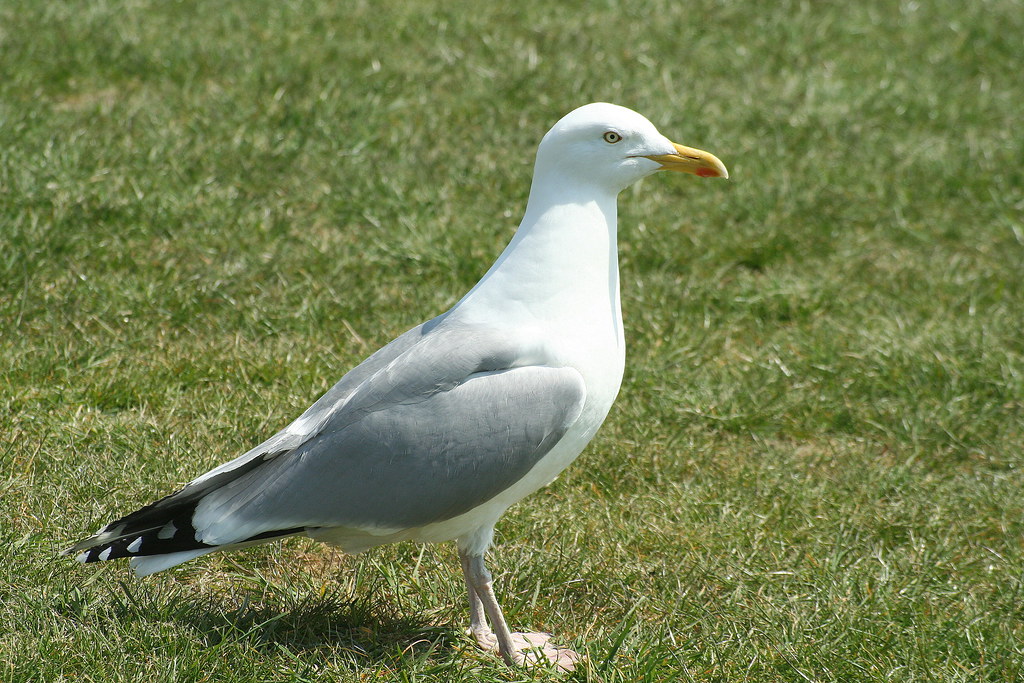Trinity students are living in fear. In the Arts Block, students whisper in huddled groups. At lunchtime, they sit on the floor together and cry into their Sprout salad boxes. In between lectures, they rush from one building to the next, anxiously looking over their shoulders at every turn. Students are being plagued by a winged monster: namely, the herring gull.
Trinity’s seagull problem has gotten completely out of hand. As any seasoned student will know, it’s entirely unsafe to eat anything outside on campus anymore. Some will have to learn this the hard way, like the tourist I saw walking through Front Square last week, brazenly eating a roll in broad daylight. “Not my roll, not my roll!” she screamed as the inevitable divebomb attack from a seagull occured. Some other tourists stopped and watched, mouths agape, as the seagull flew away with an entire chicken roll in its beak. They consoled the victim of the attack, but I averted my eyes and kept walking. Sympathy has no place in a time of war.
“…if you’re foolish enough to attempt to eat your lunch outside of the Arts Block, you deserve to have it stolen by the gulls.”
In all honesty, if you’re foolish enough to attempt to eat your lunch outside of the Arts Block, you deserve to have it stolen by the gulls. Why would you risk tempting fate? There was once a happier, pre-TEP time, when it was still safe to eat outside the Arts Block. Coincidentally, it was also before Smoke Free Trinity was in full swing, and the Arts Block benches would be covered by a perpetual murky haze of rollie smoke. The smoke acted as a natural deterrent, and so we must ask, could it be that re-introducing smoking to Trinity is the answer to the seagull plague?
Trinity has become a bountiful hunting ground for the gulls not only to find food, but also to raise the next generation of havoc-wreaking monsters. Generation by generation, the seagulls have evolved and developed their powers while students, by contrast, have continued to degenerate and become easier to intimidate in public places. Back in the eighties, when Facebook was just a twinkle in Mark Zuckerberg’s baby eye, students didn’t just sit around with their heads buried in screens all day. The young population were active, alert, and protected their food with ease. Rates of depression were lower, and so were the rates of recorded seagull attacks. Coincidence? I think not.
“The seagull’s aggression has now reached a crisis stage that is bordering on irreversible.”
It’s undeniable that the advent of social media has had a role to play in distracting students and enabling the rapid growth of the seagulls’ powers. The seagull’s aggression has now reached a crisis stage that is bordering on irreversible. Of course, there is also some truth in the fact that because of overfishing, seagulls have been driven inland, and the general littering habits of the population means that food is far more plentiful inner-city than it is out at sea. But that’s beside the point. Like all the problems we face in contemporary society, the root cause of the seagull issue is obviously millennial apathy.
The question of how to effectively combat the seagulls is a complex one. Earlier this year, The Irish Times reported that the number of breeding pairs of seagulls is estimated to have fallen by 90 per cent over the past 30 years, which has caused Birdwatch Ireland to place the gulls on a “red list” of “high conservation concern”. It is this conservation concern surrounding seagulls that renders a city-wide cull out of the question. Even removing the seagulls’ nests or eggs is banned, bar in Balbriggan, which has an exemption to this rule due to the extreme nature of the seagull attacks in the area.
If cross-city seagull extermination is out of the question, what options do we have left? Gull attacks are almost daily, and yet the SU hasn’t made a single statement on the matter. The recent establishment of the “TCD Students Against Arts Block Seagulls” Facebook page is raising awareness around the issue, however a formal plan of direct action is urgently needed. Campus has become a warzone, and it’s clear that we cannot rely on any higher powers to solve the problem. It’s up to the students to take matters into their own hands. Usually campus-wide issues like this can be solved by occupying the Dining Hall or something similarly radical, but in this instance, the seagulls have utilised our own protest method against us. Rather than students becoming occupiers, we are in fact the ones being occupied.
“Beware, for I am fearless and therefore powerful.”
Recognising that the seagull’s dominance is a product of our own negligence is the first step in coming to understand how to defeat them. By overfishing, we have disrupted the seagull’s natural food source. By surrendering burritos after one mere squawk at lunchtime, we have taught them that Trinity is a great place to get their daily meal. As Frankenstein’s monster says in Mary Shelley’s seminal novel, “Beware, for I am fearless and therefore powerful.” Much like Frankenstein’s monster, the seagulls, as a by-product of humanity’s’ own bad habits, have evolved to become utterly fearless and, it seems, infallible.
As students, we must accept that our best course of action is to stop resisting and accept the seagull overlords as our leaders. If we welcome them with open arms, feed them at every opportunity, and give into their demands, we could end this bitter long-standing conflict. As Sun Tzu wrote in The Art of War, “The greatest victory is that which requires no battle.” It’s clear that the gulls have evolved to become much stronger, faster and wiser than us. They are the apex predators of Trinity, and Dublin in general. Resistance is futile.






